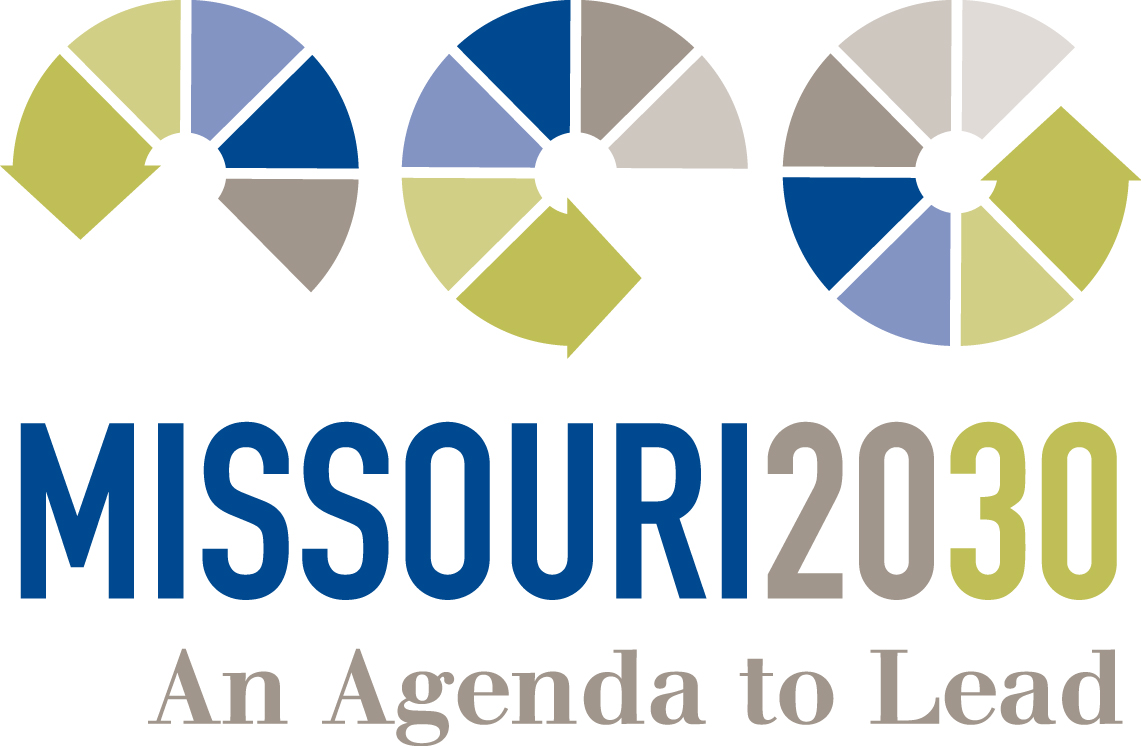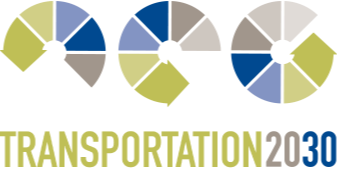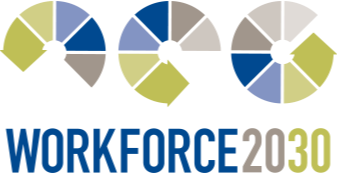Missouri 2030
The Missouri 2030 initiative is a plan to prepare the workforce, foster a competitive business climate, connect through infrastructure, unite the business community and protect health and safety.
By the time we reach 2030, the Missouri General Assembly will have seen three generations of legislators and at least three governors come and go.
We need continuity.
By the time we reach 2030, the Missouri General Assembly will have seen three generations of legislators and at least three governors come and go.
We need continuity.
setting the stage for successful growth

We need Missouri 2030: An Agenda to Lead — a bold, 15-year strategic plan to reposition Missouri as a global economic leader. Missouri will not be satisfied with middle-of-the-road economic performance; we must position our state as a global leader in key economic measurements such as workforce, infrastructure and business climate. And Missouri’s business community must lead this charge.
Missouri 2030 is rooted in an independent, year-long comprehensive analysis of our state’s economic performance, conducted by an internationally recognized research firm, Gallup, in 2014. Based on the results, we formulated a plan to empower Missouri employers from all industry sectors and every corner of the state. This agenda will drive Missouri toward better job creation, wage growth, economic productivity and output. Missouri 2030 is designed to transcend political cycles, term limits and parties and will provide a plan with transparent metrics and benchmarks that will hold leaders accountable for progress.
We have a long way to go to get to the Missouri we all want and expect. Missouri 2030: An Agenda to Lead is how we get there.
The framework of Missouri 2030 is built around five key drivers. We believe these priorities are the fundamentals of a successful economy.
PREPARING THE WORKFORCE
Through our Gallup research, we heard clearly that we need to invest in Missouri’s workforce. Only 44 percent of Missouri business owners are satisfied with the state’s availability of skilled workers. Employers cited weaknesses in the state’s ability to prepare, attract and retain workers. According to the Gallup survey:
Through our Gallup research, we heard clearly that we need to invest in Missouri’s workforce. Only 44 percent of Missouri business owners are satisfied with the state’s availability of skilled workers. Employers cited weaknesses in the state’s ability to prepare, attract and retain workers. According to the Gallup survey:
STATS:
of Missouri business owners agree high schools are preparing students for the workforce
of Missouri businesses agree colleges provide preparation for the workforce
of Missouri business owners agree Missouri attracts and retains top talent
Source: Gallup
COMPETING FOR JOBS
Without a competitive business climate, Missouri cannot become a leader in economic prosperity. Gallup dug deeply into key areas that impact Missouri’s business climate. They found that fewer than one in four employers is satisfied with Missouri’s litigation climate, tax environment or government regulations.
Without a competitive business climate, Missouri cannot become a leader in economic prosperity. Gallup dug deeply into key areas that impact Missouri’s business climate. They found that fewer than one in four employers is satisfied with Missouri’s litigation climate, tax environment or government regulations.
STATS:
of Missouri businesses feel the state’s tax environment is the biggest obstacle to growth
of businesses nationwide feel the tax environment is the biggest obstacle to growth
Source: Gallup
CONNECTING THROUGH INFRASTRUCTURE
Gallup’s research focused on the infrastructure that is necessary for Missouri’s business community to grow and be competitive. The research revealed that basic infrastructure, such as roads and bridges, is a prevalent concern of employers, especially industries that depend on roads and airports for the movement of goods. Gallup concluded that “business owners that operate day-to-day in the state feel aging infrastructure as an increasing challenge for their operations.” Transportation was one of the few areas where responses differed based on geography. The Gallup research showed that business owners in the St. Louis area were more satisfied with transportation infrastructure than those in other areas of the state.
Gallup’s research focused on the infrastructure that is necessary for Missouri’s business community to grow and be competitive. The research revealed that basic infrastructure, such as roads and bridges, is a prevalent concern of employers, especially industries that depend on roads and airports for the movement of goods. Gallup concluded that “business owners that operate day-to-day in the state feel aging infrastructure as an increasing challenge for their operations.” Transportation was one of the few areas where responses differed based on geography. The Gallup research showed that business owners in the St. Louis area were more satisfied with transportation infrastructure than those in other areas of the state.
STATS:
of Missouri business owners are satisfied with their access to technology
of Missouri business owners are satisfied with affordable and reliable energy
of Missouri business owners are satisfied with the state’s roads and infrastructure
Source: Gallup
UNITING THE BUSINESS COMMUNITY
The Gallup survey clearly identified policies that Missouri employers want addressed, but employers were not confident in elected officials’ ability to enact change. Elected officials have championed numerous economic studies and initiatives over the years, but those plans languish when the politicians leave office. Many of the findings in the Missouri 2030 research echoed previous studies and analyses. Unfortunately, no long-term, actionable plan has been put in place to implement the changes. Missouri has seen a cycle of studies pointing out problems — without a unified vehicle to act.
The Gallup survey clearly identified policies that Missouri employers want addressed, but employers were not confident in elected officials’ ability to enact change. Elected officials have championed numerous economic studies and initiatives over the years, but those plans languish when the politicians leave office. Many of the findings in the Missouri 2030 research echoed previous studies and analyses. Unfortunately, no long-term, actionable plan has been put in place to implement the changes. Missouri has seen a cycle of studies pointing out problems — without a unified vehicle to act.
STATS:
of Missouri business owners believe that politicians are committed to improving the state’s business climate
of Missouri business owners think that the Missouri Chamber should take a leadership role in positioning our state for economic growth
Source: Gallup
PROTECTING HEALTH AND SAFETY
Health and public safety affect every Missourian. Low crime rates are consistently reported as a top factor for people choosing where to live because crime influences where they shop, play and work. Health, safety and security contribute to citizens’ well-being. A lack of health and safety rob a town of its vitality and sense of community.
Health and public safety affect every Missourian. Low crime rates are consistently reported as a top factor for people choosing where to live because crime influences where they shop, play and work. Health, safety and security contribute to citizens’ well-being. A lack of health and safety rob a town of its vitality and sense of community.
STATS:
of Missourians believe crime is impacting the state’s economic competitiveness
of Missourians think the Chamber should engage in addressing crime
Source: CHS Associates
RESEARCH
A DEEPER DIVE INTO OUR PROGRESS
Our research and Gallup’s input from business leaders uncovered numerous opportunities for job growth in Missouri. There are many economic strengths upon which Missouri can build. It comes down to these two questions: How do we eliminate the obstacles to growth? How do we harness these opportunities and strengths and turn them into job creation?
A DEEPER DIVE INTO OUR PROGRESS
Our research and Gallup’s input from business leaders uncovered numerous opportunities for job growth in Missouri. There are many economic strengths upon which Missouri can build. It comes down to these two questions: How do we eliminate the obstacles to growth? How do we harness these opportunities and strengths and turn them into job creation?
progress dashboard
The Missouri 2030 Dashboard tracks our state’s progress to improve workforce, competitiveness, infrastructure and overall economic strength.
The Missouri 2030 Dashboard tracks our state’s progress to improve workforce, competitiveness, infrastructure and overall economic strength.
HOW THE DASHBOARD WORKS
1. Select a driver
2. Choose an indicator
3. The dashboard will display data relative to Missouri’s current performance
QUESTIONS ABOUT MISSOURI 2030?
For questions about the Missouri 2030 plan, contact Karen Buschmann, VP of Marketing and Communications.



